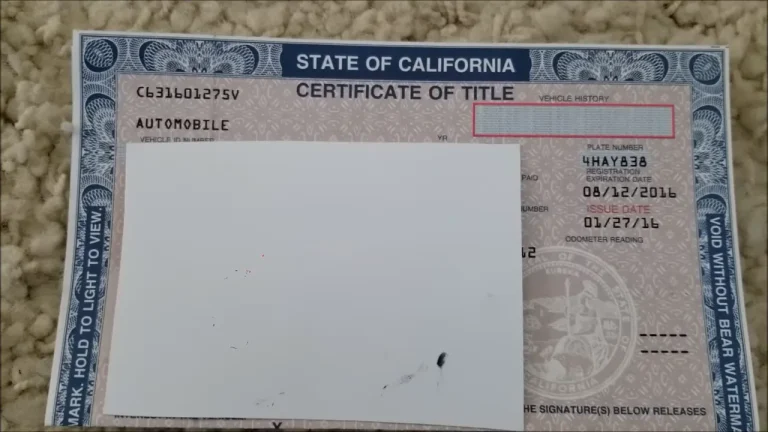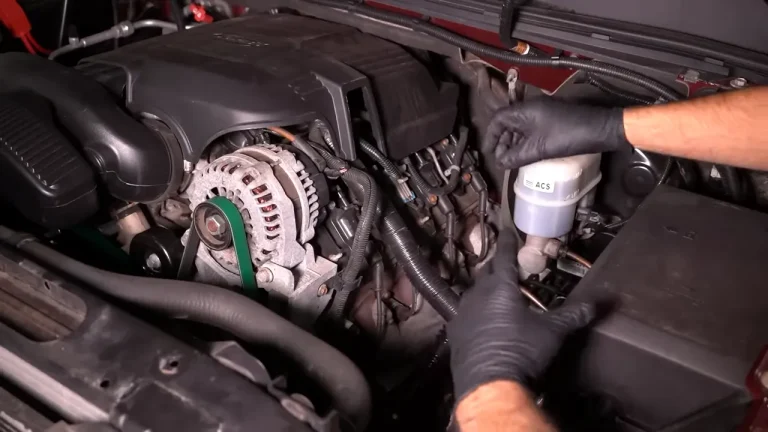Why Using a Wrong Size Battery in Your Car Can Cause Catastrophic Damage
Putting the wrong size battery in your car can cause damage to the electrical system and may prevent your car from starting or running properly. When the battery size is incorrect, it can result in a less powerful or overloaded electrical system, leading to issues such as difficulty starting the engine, flickering lights, and potential damage to the alternator.
It is crucial to use the correct battery size recommended by the manufacturer to ensure the optimal performance and longevity of your car’s electrical system. Failing to do so may lead to costly repairs and inconvenience.
The Importance Of A Properly Sized Car Battery
Choosing the correct battery size for your vehicle:
- It is crucial to select the right size battery for your car as it directly affects the performance and safety of your vehicle.
- Different vehicles require different battery sizes, so it’s important to refer to your car’s owner manual or consult with a professional mechanic to determine the correct battery size for your specific make and model.
How battery size affects performance and safety:
- Optimum performance: A properly sized car battery ensures that the vehicle performs at its best by providing the necessary power for all electrical components. Using an undersized battery can lead to insufficient power supply, resulting in poor performance and possible damage to the car’s electrical system.
- Safe start-up: The battery is responsible for providing the initial energy required to start your car’s engine. If you install a battery that is too small, it may not have enough power to start the engine reliably. This can lead to frustrating situations where your car fails to start or experiences slow cranking.
- Avoid electrical problems: Installing an oversized battery may seem like a solution, but it can lead to electrical problems. The battery’s charging system may not be designed to handle excessive power, potentially causing damage to the alternator or other electrical components.
- Longevity: Using a battery of the correct size ensures optimal lifespan. Both an undersized and an oversized battery can lead to premature failure due to excess strain or insufficient charging. An appropriately sized battery will provide the right balance and longevity.
Choosing the right battery size for your car ensures proper performance, starting reliability, and the overall safety of your vehicle. Don’t compromise on the size of your car battery as it plays a vital role in powering all the electrical systems.
Whether it’s for optimal performance, safe engine start-up, or avoiding potential electrical problems, the right battery size is essential. Consult with a professional or refer to your car’s owner manual to ensure you choose the correct battery size for your specific vehicle.
Potential Risks And Damages Caused By Incompatible Batteries
Imagine this scenario: you’re in a rush, your car battery dies, and you grab the first battery you find. However, did you know that using the wrong size battery in your car can actually cause some serious problems? In this section, we’ll explore the potential risks and damages that can occur when incompatible batteries are used.
Overcharging And Voltage Fluctuations
Using the wrong size battery in your car can lead to overcharging and voltage fluctuations, which can have detrimental effects on both the battery and the electrical system of your vehicle. Here’s what you need to know:
- Overcharging can occur when a battery with a higher capacity is installed in a vehicle that is not designed for it. The excessive energy being supplied can cause the battery to overheat and potentially explode, posing a significant safety hazard.
- Voltage fluctuations can also be a result of using an incompatible battery. If the battery’s voltage output is too high or too low, it can cause issues with the electronic components in your car, leading to malfunctions or even permanent damage.
- In addition to safety risks, overcharging and voltage fluctuations can significantly decrease the lifespan of both the battery and the electrical components of your vehicle.
Increased Heat And Battery Failure
Another risk associated with using the wrong battery size is increased heat generation and battery failure. Let’s take a closer look:
- When a battery is too small for the vehicle’s power requirements, it can struggle to deliver the necessary energy, which leads to increased resistance. This resistance produces excess heat, putting additional stress on the battery and potentially causing it to fail prematurely.
- Additionally, using a larger battery than required can lead to a mismatch in charging rates and inadequate ventilation. This can result in excessive heat buildup, accelerating battery corrosion and reducing its overall performance and lifespan.
- Battery failure not only leaves you stranded with a non-functioning vehicle but can also result in costly repairs or replacement.
Impact On Electrical Systems And Components
The impact of using the wrong battery size extends beyond the battery itself. It can also affect various electrical systems and components in your car. Here’s what you should be aware of:
- Incompatible batteries can affect the charging system, including the voltage regulator and alternator. This can result in suboptimal charging rates, leading to insufficient power supply to the vehicle’s electrical system.
- The wrong battery size can also put strain on the starter motor. If the battery cannot provide enough power to turn the engine, it can cause unnecessary wear and tear on the starter motor, potentially leading to its failure.
- Furthermore, using an incompatible battery may disrupt the delicate balance of the electrical system, impacting other components like the ignition system, fuel injectors, and even the onboard computer.
It’s vital to use the correct battery size recommended by your vehicle’s manufacturer to avoid potential risks, damages, and costly repairs. Taking the time to ensure compatibility can go a long way in maintaining the overall health and longevity of your car’s electrical system.
Remember, it’s always best to consult a professional if you’re unsure about which battery size is suitable for your vehicle.
Signs Of Damage And Risks Of Using A Wrong Size Battery
What happens if you put the wrong size battery in your car? While it may seem like a minor oversight, using a battery that is not the correct size for your vehicle can lead to various issues. In this section, we will explore the warning signs of inadequate battery size, the effects on engine starting and performance, as well as the risks of electrical fires and equipment malfunctions.
Warning Signs Of Inadequate Battery Size
- Dimmed headlights: If you notice that your headlights appear dimmer than usual, it could be a sign that your battery is not providing enough power to meet the demands of your car’s electrical system.
- Slow engine crank: A battery that is too small may struggle to provide sufficient power to start your engine, resulting in a slow and sluggish crank.
- Frequent battery replacements: Using an incorrect battery size can lead to excessive strain on the battery, causing it to wear out faster. If you find yourself replacing your battery more frequently than expected, it may be worth considering if the battery size is the issue.
- Corrosion and leaking: A mismatched battery size can lead to improper connections, which can result in corrosion and battery acid leaks. This can damage surrounding components and create hazardous working conditions under the hood.
Effects On Engine Starting And Performance
- Difficulty starting the engine: A battery that is too small may struggle to power the starter motor effectively, leading to difficulty starting the engine, especially in colder weather conditions.
- Reduced electrical system functionality: Using a battery of the wrong size can cause a strain on your car’s electrical system, impacting the operation of various components such as the alternator, ignition system, and fuel injectors. This can result in issues like stalling, misfires, and poor performance.
- Increased fuel consumption: Inadequate battery size can lead to a compromised charging system, forcing the alternator to work harder to maintain proper battery charge. This increased workload can put a strain on the engine, leading to higher fuel consumption.
Risk Of Electrical Fires And Equipment Malfunctions
- Overheating and electrical fires: If a battery that is too small is continuously pushed beyond its limits, it can overheat and potentially cause an electrical fire. This poses a serious safety risk not only to your vehicle but also to yourself and others nearby.
- Malfunctioning electrical equipment: Using an incorrect battery size can result in fluctuating voltage levels, damaging sensitive electronic components in your car such as the stereo, navigation system, and computer modules. This can lead to malfunctions, failure, and costly repairs.
It is crucial to ensure that you use the correct battery size recommended by your vehicle’s manufacturer. If you suspect that you have a wrong size battery installed, it is best to consult a professional mechanic who can assess the situation and make the necessary adjustments to optimize your car’s performance and safety.
Remember, the right battery size will not only provide reliable power but also help prolong the life of your electrical system.
Final Thoughts
Putting the wrong size battery in your car can lead to several issues, from minor inconveniences to major problems. It’s important to make sure you have the right battery for your vehicle to avoid potential risks and ensure optimal performance.
In this final section, we will discuss the importance of regular battery maintenance and inspection, the benefits of consulting with a professional for battery replacement, and the dangers associated with using incorrect batteries.
Importance Of Regular Battery Maintenance And Inspection
- Regularly check your car battery for any signs of damage or corrosion.
- Ensure the battery is securely fastened in place to avoid vibration or movement.
- Clean the battery terminals and connections to prevent buildup of corrosion.
- Test the battery’s voltage and overall condition to ensure its reliability.
- Perform routine checks on the battery’s electrolyte levels and replenish as necessary.
- Consider using a battery maintainer or tender if your vehicle is not frequently driven.
- Following these maintenance tips will help prolong your battery’s lifespan and prevent unexpected failures.
Consultation With A Professional For Battery Replacement
- When it’s time to replace your car battery, seek professional advice.
- A qualified technician will help you select the right battery size and type for your vehicle.
- They can perform a proper installation, ensuring all connections are secure.
- Professionals have the necessary equipment to test the battery before and after installation.
- By consulting with an expert, you can save time, money, and potential headaches down the road.
Understanding The Dangers Of Using Incorrect Batteries
- Using an oversized battery can damage the battery tray or other components in your car.
- An undersized battery may not provide enough power to start your vehicle reliably.
- Incorrect battery sizes could lead to poor performance and decreased fuel efficiency.
- In some cases, using the wrong battery can void your vehicle’s warranty.
- It is crucial to consult the owner’s manual or seek professional advice to determine the correct battery size and specifications for your specific make and model.
By giving attention to regular battery maintenance and inspection, consulting a professional for battery replacements, and understanding the dangers of using incorrect batteries, you can ensure the optimal performance and longevity of your car’s electrical system. Remember, always choose the right size battery for your vehicle to avoid potential risks and unexpected breakdowns.
Now that you are aware of the potential consequences, make sure to take the necessary precautions when dealing with car battery replacements. Stay safe on the road and enjoy worry-free travels!
Conclusion
It is crucial to use the correct size battery in your car to avoid potential issues and ensure optimal performance. Putting the wrong size battery can lead to various problems such as electrical system failures, difficulty starting the engine, and even damage to your vehicle.
The incorrect battery size can result in insufficient power delivery, causing strain on other components and potentially leading to expensive repairs. Investing in the right battery size for your car is essential for its overall functioning and longevity. Always consult your car’s manual or seek professional advice to determine the appropriate battery size for your specific make and model.
By taking this simple precautionary measure, you can avoid unnecessary complications and enjoy a smoother and hassle-free driving experience.
- Why Are My Car Headlights Not Bright Enough? - May 9, 2024
- How Long Can You Drive With An EVAP Leak? - May 9, 2024
- What Does B Stand for in a Car? [Full Guide] - May 9, 2024



